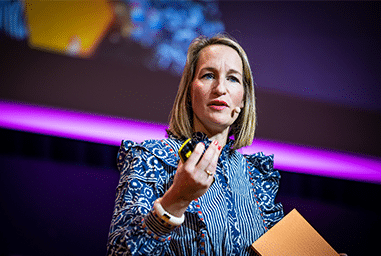The 11th Online Print Symposium invited participants to address the question of what role artificial intelligence could play in the future. More than 290 participants from 16 countries discussed the potential of artificial intelligence at the Science Congress Centre Munich. High-calibre speakers and exciting start-ups provided plenty of evidence that print and AI complement each other perfectly.
AI has arrived in the printing industry – there was no doubt about that at the end of the 11th Online Print Symposium. But “AI alone is not yet a competitive differentiator”, as Kirsten Hommelhoff, the new Managing Director of the German Printing and Media Industries Federation, emphasised in her keynote speech. Henrik Müller-Hansen, CEO of software manufacturer Gelato, also pointed out that “artificial intelligence is not a solution, but a tool”. It therefore depends on AI tools and the right mindset to adapt to new developments, or, as Steffen Tomasi from Flyerline Schweiz AG put it in his presentation: “Adapt or perish”.
Mass customisation
“The digital printing industry is one of the most exciting and dynamic industries in the world“. Not only because the printing industry’s global turnover of almost 850 billion US dollars is much than most people would assume, but also because it now also occupies market segments that could not be identified as a potential print market just a few years ago with print-on-demand, personalisation and mass customisation offerings. “The trend towards mass customisation is becoming a triumph,” said Müller-Hansen, who predicted further growth for the digital printing industry.
New era
Bernd Zipper, CEO of zipcon consulting, came to a similar conclusion in his presentation, which provided an insight into the developments and figures of online printing. “We have never had so many opportunities to earn really good money with print! If,” he said, “we understand what the new rules are”. Rules ranging from inkjet and sustainability to social commerce accelerated by artificial intelligence. “The days of waste are over,” summarised Zipper. Instead, “individualisation will be the ‘new gold’ and print on demand will be the ‘king'”.
AI – booster for an industry
“AI alone is not yet a competitive differentiator. […] But if you want to remain competitive, you have to come to terms with AI,” said Kirsten Hommelhoff, who also shed light on the legal rules of artificial intelligence. She emphasised that AI will play a key role in all sectors of a company. She also emphasised how essential transparency, clear rules and trust are for the success of the transformation process.
Data as a product
According to Dr Sebastian Klapdor, CTO and Chief Data Officer at Vista, data is the starting point for the successful implementation of AI strategies. “Data is essential for increasing the value of artificial intelligence, but most companies struggle to capitalise on it,” he concludes. In his experience, it is only through the use of data as an essential part of the corporate culture that processes can be accelerate processes and implement plans better.
AI in customer service
The symbiosis of AI and customer service was also the topic of Tjimen van den Elzen, co-founder of Engaige. The Dutch company has developed its own AI custumer service agent, which, after just a few months, significantly improved customer service and customer satisfaction at the well-known online printer.
Mass customisation
An example of what 100% commitment looks like and what it can achieve was given by Steffen Tomasi, founder and CEO of Flyerline Schweiz AG. His company has had an eventful history, with the sale and repurchase of shares, from pure digital printing to digital and offset and back to pure digital printing. “Our path is 100% digital and mass customisation is our business model. Adapt or perish is our motto, because if you don’t move with the times, you move with the times.”
Community for the community
The new community app, which participants could use to network with each other, was also a première. “Once again this year, we were deeply impressed by how openly and intensively the participants at the Online Print Symposium discussed current topics, formulated new ideas and built networks, new ideas were formulated and networks were established,” summarises moderator and co-organiser Bernd Zipper. Jens Meyer adds: “The innovative spirit of the industry is clearly noticeable at the OPS is clearly noticeable. Once again this year, the participants of the Online Print Symposium back to their companies with great enthusiasm and a large portion of motivation.”
OPS2025
The next Online Print Symposium will take place from 2 to 4 April 2025 in Munich.
Zipcon
Zipcon Consulting GmbH is a global consulting company for the communications, print and media industry specialising in online print and digital transformation. The company sees itself as an independent and holistic technology and strategy consultant. zipcon produces market studies and various case studies for e-business print, mass customisation and multichannel publishing.
BVDM
The Bundesverband Druck und Medien e. V. (bvdm) is the umbrella organisation of the German printing industry. As an employers’ organisation, political business association and technical trade association, it represents the positions and objectives of the printing industry vis-à-vis politicians, administration, trade unions and the supplier industry. The bvdm is supported by eight regional associations. Internationally, it is organised through its membership of Intergraf and FESPA. The printing industry currently comprises around 6,900 predominantly small and medium-sized companies with more than 110,000 employees subject to social security contributions.

